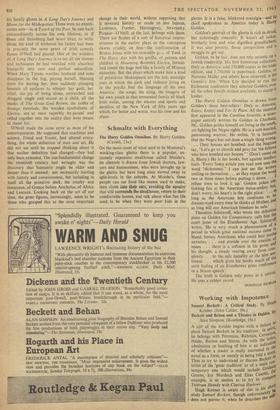Schmaltz with Everything
The Harry Golden Omnibus. By Harry Golden. (Cassell, 21s.)
ON the main street of what used to be Montreal's working-class ghetto there is a popular, ex- tremely expensive steakhouse called Moishe's. Its clientele is drawn from Jewish doctors, law- yers and businessmen, who were brought up in the ghetto but have long since moved away to split-levels in the suburbs. At Moishe's, these people can eat food like mama used to make, then climb into their cars, avoiding the squalor that still surrounds the steakhouse, return to their comfortable homes, and talk about what fun life used to be when they were poor kids in the
ghetto. It is a false, blinkered nostalgia—and its chief spokesman in America today is Harry Golden.
Golden's portrait of the ghetto is rich in detail, but sickeningly romantic. It wasn't all hatkas, brotherly love and wise dignified grandfathers. It was also poverty, fierce competition and a struggle to get out.
Golden, to be fair, does not rely entirely on a Jewish readership. His first humorous collection,
Only in America, sold 250,000 copies in the trade edition, and 1,750.000 in paperback. Golden, as Norman Mailer and others have observed, is the
Gentile's Jew. When Life decided to run the Eichrnann confession they selected Golden, over all the other Jewish writers available, to stamp it kosher.
The Harry Golden Omnibus is drawn from Golden's three best-sellers: Only in America; Enjoy, Enjoy; and For 2c Plain. All the material first appeared in the Carolina Israelite, a news- paper entirely written by Golden in Charlotte, NC. Golden prides himself on living in the south, yet fighting for Negro rights. He is a soft-hearted, patronising warrior. He writes, 'It is fantastic that the Negro has not done a single thing wrong' . . Their houses are bombed, and the Negroes say, "Let's go to church and pray for the fellows who have bombed our houses." ' (Don't count 00 it, Harry.) He is for books, but against intellec- tuals. 'Every fancy article you read now uses the word "dichotomy." I can just see the writers smiling to themselves ... as they repeat the wor, two or three times before putting it down. . • • refuse even to look it up.' Golden pokes rib' tickling fun at the American status-seeker, but, don't worry, his heart's in the right place: `. • as long as the American boy continues to be, dreamy-eyed every time he thinks of Mother, in so long will our American freedom be safe.' Theodore Solotaroff, who wrote the definitive piece on Golden for Commentary, calls him tb,.e, court jester of the Eisenhower Age. Solotaron writes, 'He is very much a phenomenon of a period in which great national success came to bland, homey Americans who could best soothe
,
anxieties . . . and preside over the evasion 0! issues . . . there is a softness in his prose and his thought, a steady veering away from COny' plexity . . . to the safe banality or the nice sen- timent . . which gives his books much of the eerie feeling of an Eisenhower press conference or a Nixon speech.'.
The truth is Golden only poses as a satirist. He uses a rubber sword.
MORDECAI RICHLEII










































































 Previous page
Previous page